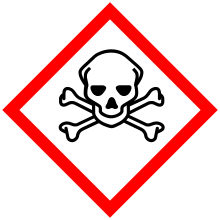
The history of poison[1] stretches from before 4500 BCE to the present day. Poisons have been used for many purposes across the span of human existence, most commonly as weapons, anti-venoms, and medicines. Poison has been heavily studied in toxicology, among other sciences, and its use has led to several technological innovations.
Poison was discovered in ancient times, and was used by ancient tribes and civilizations as a hunting tool to quicken and ensure the death of their prey or enemies. This use of poison grew more advanced, and many of these ancient peoples began forging weapons designed specifically for poison enhancement.[citation needed] Later in history, particularly at the time of the Roman Empire, one of the more prevalent uses was assassination.[2] As early as 331 BCE, poisonings executed at the dinner table or in drinks were reported, and the practice became a common occurrence. The use of fatal substances was seen among every social class; the nobility would often use it to dispose of unwanted political or economic opponents.
In Medieval Europe, poison became a more popular form of killing, though cures surfaced for many of the more widely known poisons.[citation needed] This was stimulated by the increased availability of poisons; shops known as apothecaries, selling various medicinal wares, were open to the public, and from there, substances that were traditionally used for curative purposes were employed for more sinister ends.[citation needed] At approximately the same time, in the Middle East, Arabs developed a form of arsenic that is odorless and transparent, making the poison difficult to detect. This "poison epidemic" was also prevalent in parts of Asia at this time.[citation needed]
Over the centuries, the variety of harmful uses of poisons continued to increase. The means for curing these poisons also advanced in parallel. In the modern world, intentional poisoning is less common than the Middle Ages. Rather, the more common concern is the risk of accidental poisoning from everyday substances and products.
Constructive uses for poisons have increased considerably in the modern world. Poisons are now used as pesticides, disinfectants, cleaning solutions, and preservatives. Nonetheless, poison continues to be used as a hunting tool in remote parts of developing countries.
- ^ Poison is defined as a "substance that causes death or injury when swallowed or absorbed." Colins Dictionaries, from the Bank of English (2001). Collins English Dictionary. HarperCollins. p. 594. ISBN 0-00-766691-8.
- ^ Siek B, Rys A, Sein Anand J. Najbardzie; popularne trucizny świata grecko-rzymskiego [The most popular poisons from Graeco-Roman world]., Przegl Lek. 2013;70(8):643-6. Polish. PMID = 24466710.